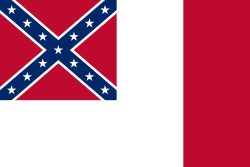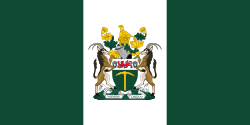Herrenvolk democracy
system of government that excludes minorities From Wikipedia, the free encyclopedia
Remove ads
Remove ads
Herrenvolk democracy is a form of government with elections in which only one ethnic group or racial group has the right to vote, the right to run for political office and the right to be employed in the bureaucracy, while other groups are disenfranchised.[1] Herrenvolk democracy is a subtype of ethnocracy, which means any form of government where one ethnic group controls the state, with or without elections. The German term Herrenvolk, meaning "master race", was used in 19th century ideology that justified colonialism with the supposed racial superiority of Europeans.[2] The term Herrenvolk democracy was first used in 1967 by the sociologist Pierre van Den Berghe in his book Race and Racism.[3]
Confederate States of America
Apartheid South Africa
Republic of Rhodesia
The Confederate States of America (flag, top; 1861–1865), Apartheid South Africa (flag, middle; 1948–1994), and Rhodesia (flag, bottom; 1965–1979) are considered typical examples of Herrenvolk democracy. Elections were generally free, but voting suffrage was restricted based on race, with governance that reflected the interests of the politically dominant racial group.
Remove ads
Characteristics
This elitist form of government is typically used by one ethnic group or racial group to keep control and power within the system. It is often accompanied with a false pretense of egalitarianism. As people of the dominant ethnic group or racial group gain freedom and liberty and egalitarian principles are advanced within that ethnic group or racial group, other ethnic groups are oppressed and prevented from being involved in the government and from having economic power. This can be seen in the development of the United States (especially the Southern states), Apartheid South Africa and Rhodesia in the 19th and 20th centuries.[4]
Remove ads
Related pages
References
Wikiwand - on
Seamless Wikipedia browsing. On steroids.
Remove ads



